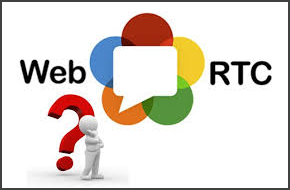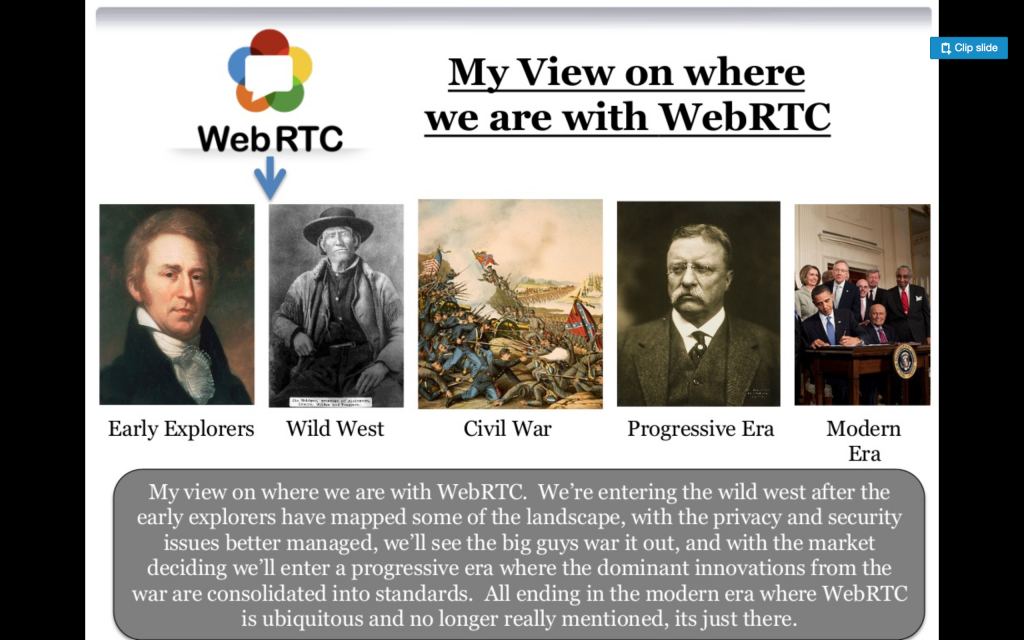 Its 2017, WebRTC (Web Real Time Communications) became known in 2011 when Google open sourced intellectual property it had bought in previous years. Gossip about those acquisitions began in 2009. The IETF (Internet Engineering Task Force) was already laying the ground work with Opus (voice codec) officially in 2010, and back in 2009 the discussion process started. I consider 2009 to be where the chatter began in earnest and plans were put into place. By 2011 things were really coming together quite fast. In 2012 I wrote a simplified review of WebRTC and its impact in “What WebRTC means to Telecoms“, read the comments to get the full picture of back then. 5 years ago!
Its 2017, WebRTC (Web Real Time Communications) became known in 2011 when Google open sourced intellectual property it had bought in previous years. Gossip about those acquisitions began in 2009. The IETF (Internet Engineering Task Force) was already laying the ground work with Opus (voice codec) officially in 2010, and back in 2009 the discussion process started. I consider 2009 to be where the chatter began in earnest and plans were put into place. By 2011 things were really coming together quite fast. In 2012 I wrote a simplified review of WebRTC and its impact in “What WebRTC means to Telecoms“, read the comments to get the full picture of back then. 5 years ago!
Everything seemed so exciting back then, and here we are in 2017. With WebRTC events being delayed or wrapped into other events or simply cancelled. People are commenting on the lack of commercial success of WebRTC applications. We’re clearly in the trough of disillusionment. Yet WebRTC is available on most computing devices today. Most of the communication apps we use include WebRTC. So what happened to create this perception?
Grossly simplifying the situation, and I know this will annoy some people, WebRTC is 2 things:
- An open source project, which is going well with respect to usage, but is limited to a niche of telecoms developers who understand the details of RTC (Real Time Communications); and
- A browser API, which continues to struggle to reach a broad community of web developers.
The open source project is used in services from Google, through Facebook, Appear.in, to secure communication clients like Wire. But its a limited community of developers as the open source project requires deep expertise to use and integrate. Take Appear.in for example, an impressive service, with a world class development team; they attracted Philipp Hancke to join them. Yes, they use the browser WebRTC API as their service is currently limited to Firefox and Chrome. BUT they do much more than just use the browser API to deliver their world class service. I’m not saying your WebRTC projects can not be successful without a Philipp Hancke on your team, sorry @HCornflower, I mention to highlight the WebRTC skills are still rare and important to delivering great services.
For the browser API we’re still waiting on Apple, with Microsoft its complex, and the standards continue to plod along. Is WebRTC ready yet, captures the standards piece. But even when it looks like the browser API is sorted, we’ll likely find it heralds the opening salvoes in a WebRTC Civil war. I show below the analogy I used back in 2013 to explain WebRTC’s development and the phases of American History. Today we’re coming to the end of the Wild West, with the Civil War to come…
The analogy to the “Cathedral and the Bazaar” for WebRTC is quite relevant. The Cathedral (open source) has delivered to a specialized segment of developers. The Bazaar (web) has not done as well because the browser is controlled by a few entities. Its not really a Baazar, rather a regulated mall with 3 stores. One giving away stuff for your privacy, another selling expensive fashionable products to people who happily give their money away, and another that’s a bit like Sears (only Baby Boomers shop there). The regulation is the standards, which all three stores are either trying to ‘improve upon’ or are likely to be ‘improving upon’ for their own benefit. Just like the services using the open source WebRTC software do today to make their services just work.
So what does this all mean? Firstly, like my rants on APIs, WebRTC is just a technology, its just a piece of the solution. Services just need to work, and you need more than WebRTC for that to happen in most use cases. Relying on the browser API having everything you need for your service is not feasible. In time we will get there, but its not going to happen in 2017 or 2018. For today you need either a team of world class RTC experts on your pay roll, or a telecom API provider (with a world class team on their pay roll), to help make your services just work.
The promise of WebRTC is slow in coming, beware people telling you its just around the corner. Point out to them they sound like the RCS (Rich Communication Services) crowd. Focus on understanding your needs wrt real time communications, and work with providers and communities that can help you make the best decision for you. This is partially why we created TADHack, we’re neutral, come join us at our events around the world, we have TADHack-mini Orlando coming up in March just before Enterprise Connect. Or simply chat on the TADMentor channel to learn about telecoms / WebRTC and all the ways you can add it to your apps, services and business, to connect people and things together. WebRTC is likely part of the answer, its not the complete answer, the skill is discovering the right mix for you.
The rarified WebRTC skills will in time become more common or garden, like we saw in web development. The current need for specialists in RTC will last for at least the next decade. And like web development today, you need skilled developers for project success, its just in time more web developers will have telecoms / WebRTC in their toolbox.

I feel there will not be a civil war in the world of WebRTC because there is no need for federation. 🙂
Thanks, Alan, I found myself pondering similar question during past holidays.
On one hand, looking from the point of view of a enterprise or mass market service, the promise of including communications is wonderful, but, inline with your “telecom is not telco” headline, communication has a very strong real time and transactional component, quite different from what is required by other services. Many projects are struggling, reinventing the wheel. Talent currently locked in old-fashioned telco vendor cubicles has to get free and engage with a more entrepreneurial job market. And that’s very hard.
On the other hand, telco vendors and communication service providers are waking up to the fact that WebRTC is just another access technology, not about radio (not a 6G or 7G), but about web. They have not been very successful on leveraging radio access, they are finding even harder to find what to do with web access.